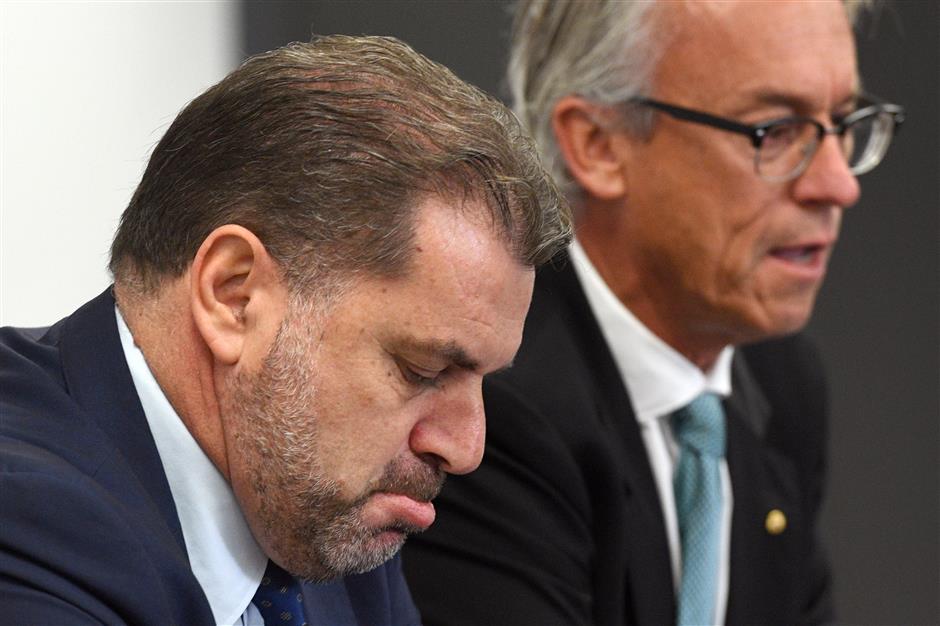Postecoglou quits after guiding Socceroos to World Cup in Russia

Australia head coach Ange Postecoglou reacts beside Football Federation of Australia chief David Gallop during a press conference to announce his resignation in Sydney on November 22, 2017. An emotional Postecoglou said he will not take the Socceroos to the World Cup next year after a lengthy qualification campaign, leaving the team just months to find a new coach for Russia.
Ange Postecoglou framed his departure as Socceroos head coach with a stereotypically Aussie scenario.
He'd decided to quit last week immediately after Australia qualified for a fourth consecutive World Cup, only to be talked out of it an hour later.
Five beers later, he was wavering amid the celebrations. A week later, he made the announcement on Wednesday that he wouldn't be taking the Australian team to next year's World Cup in Russia despite guiding the Socceroos through a grueling, 22-game qualifying campaign that concluded with back-to-back, winner-takes-all playoff series.
"It's been the toughest decision. It's not the ending I envisaged," said Postecoglou, who replaced German coach Holger Osieck in 2013 and guided Australia at the 2014 World Cup. "I'll always have a sense of unfinished business, but that would probably have been the case whenever I left.
"It's just an instinct — I think it's the right time for me, for the team and for the organization."
Australia narrowly missed out on direct entry for Russia, finishing out of the automatic spots only on goal difference in Asian qualifying.
Speculation about Postecoglou's future increased after a newspaper report in the wake of Australia's Asian playoff win over Syria suggested he would not take the team to Russia regardless of what happened in the intercontinental playoff against Honduras.
Postecoglou refused to comment on the reports at the time, and appeared to be increasingly aggravated by the continued focus on his position while the team was preparing for crucial matches in Honduras and in Sydney.
On Wednesday, he called a morning news conference in Sydney with Football Federation Australia chief executive David Gallop to announce his decision to stand down.
"It has been a privilege for me to coach my country's national team, to lead them at the 2014 World Cup, to win the Asian Cup in 2015 and now to have qualified for the World Cup next year," he said.
"All this, however, has taken a toll on me both personally and professionally. It is with a heavy heart that I must now end the journey."
Postecoglou was criticized at times for persevering with a three-man defensive system, and for Australia's lack of finish in front of goal in Asian qualifying when missed opportunities forced the team into the difficult playoff route to Russia.
Tim Cahill, Australia's all-time leading goal scorer and a significant contributor to Australia's four World Cup qualifying campaigns, said Postecoglou's commitment and sense of national pride set him apart from many coaches.
"His leadership and beliefs are infectious and I'm proud that I had the chance to share his journey with him and witness his love for our country," Cahill was quoted as saying on Wednesday. "The most important part was the belief he instilled in us to play a style of football that could test any team we came up against."
Permanent replacement
National team coaches are due to attend a meeting in Moscow next week before next Friday's World Cup draw, but it's unlikely Australia will appoint a permanent replacement before then. Australia joins Serbia and Saudi Arabia as countries going to the World Cup without the coach who got them there.
"We will not rush this process. The Socceroos will not play again until March next year" Gallop said. "With a guaranteed place in the World Cup, I am sure we will attract a strong field of candidates."
Graham Arnold, the coach of A-League champion Sydney FC, and Tony Popovic, who led Western Sydney Wanderers to the 2014 AFC Champions League title before taking over at Turkish club Karabukspor this year, will be the leading local candidates to replace him.
Postecoglou said his main legacy would be how he'd focused on playing in an Australian style and how he'd rejuvenated the national squad, starting with an inexperienced team in Brazil three years ago and ensuring they'll be competitive in 2018 and 2022.
"We've changed the way we play, whether people like it or not, think it's good or not," he said. "It's undeniable we play different football today than we played four years ago — I don't think me leaving now detracts from that.
"I know everyone was hanging on the one result last week to measure whether I was successful or not. I get it, that's the nature of sport, but bigger things were driving me when I took this job. From that perspective, I've accomplished what I wanted to do."
The 52-year-old Greek-born former Socceroo was asked when he'd finally decided it was time to quit.
"Probably straight after the game," he said of last week's 3-1 win over Honduras in front of 77,000 fans in Sydney. "Then an hour later (Gallop) convinced me not to. Then an hour later, I changed my mind again. Then five beers later I didn't know where I was.
"I've been fluctuating, but I'm also mindful that I didn't want this to drag on. Took the weekend to digest everything that happened last week — I really wanted to enjoy that — then I knew it was time to go."















